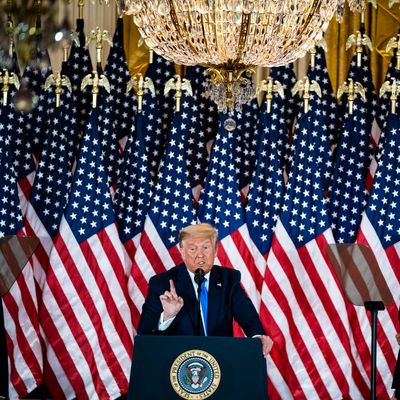
Donald J. Trump’s victory claim in the wee hours of November 4, 2020, was a pretty big moment in American political history. It launched a challenge of the election results that hasn’t ended even eight months later, and shows signs of becoming a “bloody shirt” that could dominate Republican rhetoric for years to come.
So like many political observers, I read the Election Night account given by Trump White House insiders to Washington Post reporters Carol D. Leonnig and Philip Rucker for their book I Alone Can Fix It: Donald J. Trump’s Catastrophic Final Year with interest, and then with astonishment. To hear these sources tell it, everyone in the White House other than a possibly inebriated Rudy Giuliani was tensely awaiting the full returns — understanding they would take days or weeks to come in — when Trump shocked everyone by taking Giuliani’s advice and saying he had already won, and would go all the way to the Supreme Court if necessary to stop the voting he claimed was still underway. According to this account, Trump’s speechwriters had prepared remarks cautioning patience in assessing the results, but instead the 45th president, smarting from the “betrayal” he experienced when Fox News called Arizona for Joe Biden, tossed it away and began the “stop the steal” crusade that culminated in an attempted coup the following January and convinced many millions of Republican voters they had indeed been robbed.
This tale of a sudden lurch into Election Night madness is as implausible as Trump’s attempt to preemptively declare victory that same night was unsurprising — and horrifying.
Since the spring of 2020, I and many other journalists had been predicting that Trump’s near-hourly attacks on voting by mail were intended to produce exactly this sort of scenario: The in-person votes first counted would tilt red, enabling him and his supporters to claim victory and then challenge the validity of the blue-leaning mail ballots that would be counted later. There was even a name for this scenario, the “Red Mirage,” based on which votes would be tabulated and reported first. It produced widespread discussion in early September. But Trump’s apparent plans were clear much earlier.
So is it really likely that the thought of doing exactly that only occurred to Trump just before he walked out to inform the nation of his thoughts? That’s what Trump’s insiders clearly want us to believe via the Post reporters’ book:
After a while, Rudy Giuliani started to cause a commotion. He was telling other guests that he had come up with a strategy for Trump and was trying to get into the president’s private quarters to tell him about it. Some people thought Giuliani may have been drinking too much and suggested to Stepien that he go talk to the former New York mayor. Stepien, Meadows and Jason Miller took Giuliani down to a room just off the Map Room to hear him out … Giuliani’s grand plan was to just say Trump won, state after state, based on nothing. Stepien, Miller and Meadows thought his argument was both incoherent and irresponsible.
“We can’t do that,” Meadows said, raising his voice. “We can’t.”
Hmmm. Rudy has this brilliant idea that the chattering classes had been discussing for months and months and Trump’s staffers were shocked to hear of it, off the top of Giuliani’s possibly fogged head?
Now, it’s possible that Trump and his advisers were hesitating in implementing a victory-claim plan because there was a better chance that anyone expected he could win without skulduggery. But was the claim spontaneous?
It seems more likely that Trump’s staff is doing a little retroactive gaslighting and ass-covering to cleanse themselves of responsibility for the nightmare that later ensued. It’s absolutely true that Trump himself bears responsibility for the attempted election coup, whenever it was that the election-victory-claim scheme began to become strategy. It’s why he was ultimately impeached a second time. But it did not come as a bolt from the blue; it wasn’t just a coincidence that what we all thought Trump might do he just happened to do, on a whim. And if, as one should fear, Trump’s refusal to accept defeat becomes permanent for his supporters, everyone in on the plot should accept their share of the blame. Let’s hope there’s more digging around in the debris of November 4 and all that led up to it.






























